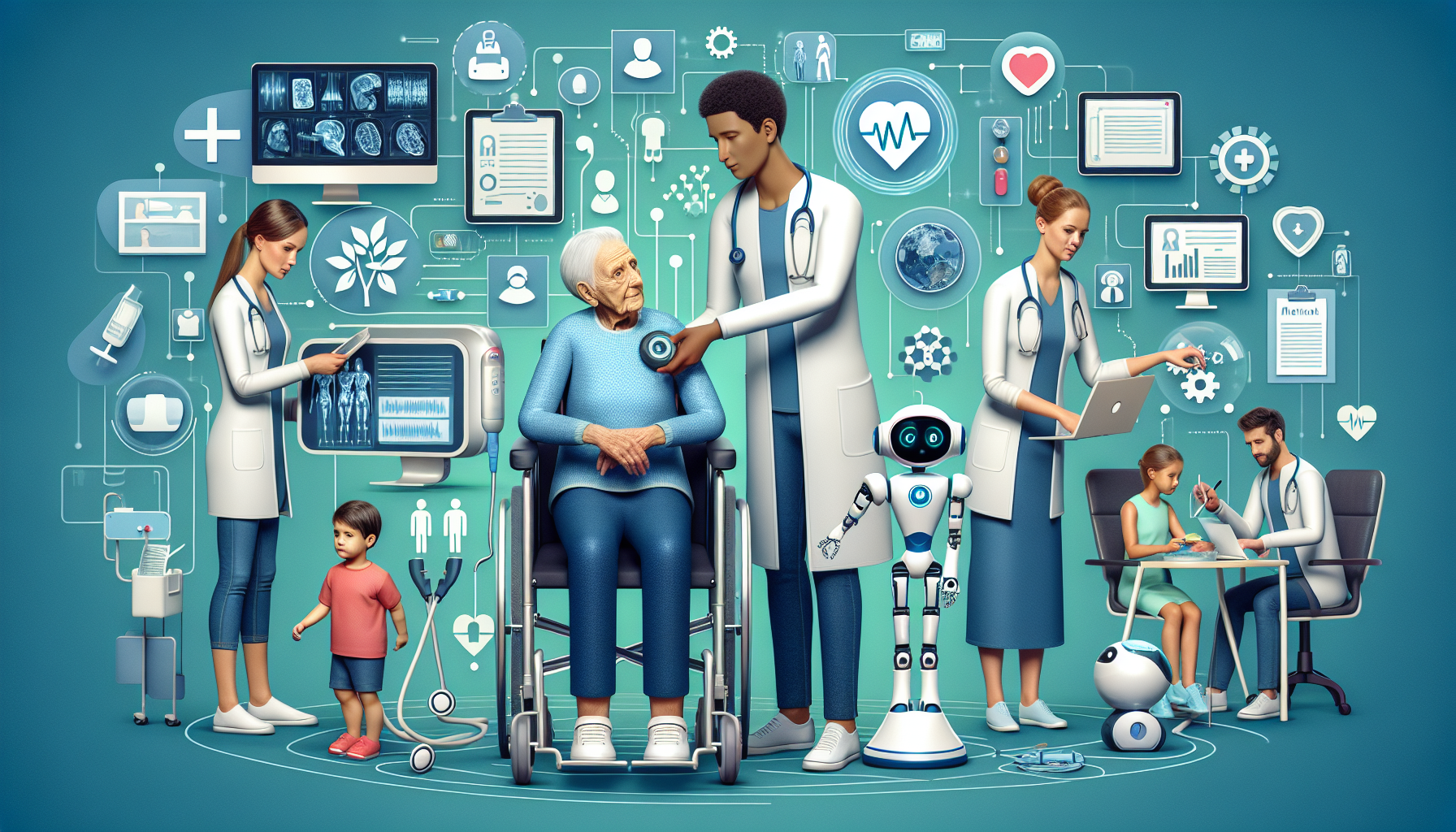The Impact of AI on Patient Care
Artificial Intelligence (AI) is transforming the landscape of healthcare, particularly in enhancing patient care through improved diagnosis, treatment accuracy, and personalized medicine. By analyzing vast amounts of medical data, AI algorithms can identify patterns and predict patients’ health outcomes, enabling healthcare professionals to make informed decisions swiftly.
Precision Diagnosis
AI-driven diagnostic tools are reshaping how clinicians identify diseases. Machine learning algorithms, trained on extensive datasets, can achieve accuracy levels that often surpass those of human specialists. For instance, AI applications in radiology can analyze medical images (like X-rays and MRIs) to detect anomalies such as tumors or fractures at earlier stages. This capability not only speeds up the diagnosis process but also enhances early intervention, ultimately improving patient survival rates.
Personalized Medicine
Another significant benefit of AI in patient care is the development of personalized treatment plans. By analyzing individual characteristics, including genetic information, lifestyle choices, and previous health records, AI can help physicians tailor interventions specific to each patient. For example, AI tools are increasingly utilized to recommend the most effective medications for conditions such as cancer, based on the patient’s genetic makeup.
Enhancing Administrative Efficiency
Beyond direct patient care, AI plays an essential role in streamlining administrative tasks in healthcare organizations. These improvements not only reduce overhead costs but also free healthcare providers to focus more on patient interaction.
Streamlining Scheduling and Optimizing Resources
AI algorithms can significantly enhance the scheduling of appointments. By analyzing patient flow data, AI systems can predict peak times and optimize scheduling to reduce wait times and maximize resource allocation. Additionally, these systems can manage cancellations and reschedule missed appointments more efficiently, ensuring better utilization of healthcare services.
Automating Documentation
Documentation is necessary but time-consuming. AI technologies such as natural language processing (NLP) can automate the transcription of clinical notes. This allows healthcare professionals to focus less on paperwork and more on patient care. AI can categorize and summarize patient encounters, ensuring that all relevant information is captured without causing inconvenience for both patients and providers.
Improving Patient Engagement
AI-driven tools and applications are enhancing patient engagement, a crucial aspect of effective healthcare delivery. Engaged patients tend to have better health outcomes and a more active role in managing their health conditions.
Chatbots for Immediate Support
AI chatbots are increasingly being used to handle patient inquiries, provide health information, and offer basic advice. Available 24/7, these chatbots can answer common questions about symptoms and medications, direct patients to appropriate resources, and even help schedule appointments. This instant access to information helps empower patients, ensuring they feel informed and involved in their healthcare journey.
Remote Monitoring and Telehealth Solutions
AI technologies are facilitating remote patient monitoring and telehealth services, allowing healthcare providers to oversee patient health without the need for in-person consultations. Wearable devices track vital signs, and AI can alert healthcare providers when these indicators deviate from normal ranges. This proactive approach to monitoring chronic diseases such as diabetes or cardiovascular issues can significantly reduce the likelihood of emergencies.
Enhancing Clinical Decision Support
AI tools are proving invaluable in supporting clinical decision-making processes. Decision support systems that utilize AI can aid in creating treatment recommendations by analyzing a vast array of clinical data.
Predictive Analytics
AI can process historical patient data and identify those at risk for certain health conditions or complications. Predictive analytics empowers healthcare providers to intervene early, tailor preventative measures, and improve population health outcomes. This capability is especially beneficial for managing chronic diseases, where timely intervention can significantly alter patient trajectories.
Evidence-Based Treatment Recommendations
AI systems can be programmed to sift through and analyze medical literature and clinical guidelines, presenting healthcare professionals with the latest evidence-based recommendations. This ensures that practices remain current and align with the evolving medical landscape, minimizing variations in care and enhancing quality outcomes.
Overcoming Challenges
Despite its promises, integrating AI into healthcare is not without challenges. Issues such as data privacy, integration with existing systems, and the need for comprehensive training programs for healthcare providers must be addressed.
Data Privacy and Security
AI systems require access to extensive patient data to function effectively. This raises concerns about data privacy and security. Healthcare organizations must implement robust security measures and maintain transparency to build trust with patients and comply with regulations such as HIPAA.
Integration within Existing Systems
Another challenge lies in the integration of AI solutions with current healthcare systems. Many healthcare providers are still using outdated IT infrastructures, which can complicate the deployment of new AI technologies. Seamless integration is essential for maximizing the benefits of AI, and this often requires substantial upfront investment.
Training Healthcare Professionals
To leverage AI effectively, healthcare professionals must be equipped with the necessary skills and knowledge. Comprehensive training programs are crucial to ensure that staff understand how to utilize AI tools efficiently while maintaining a human touch in care delivery. Ongoing professional development will be critical as the capabilities of AI continue to advance.
The Future of AI in Healthcare
The potential of AI in enhancing healthcare efficiency is profound. As technology continues to evolve, its integration into patient care and administrative processes is poised to become more sophisticated.
Continuous Improvement through Machine Learning
With advances in machine learning and neural networks, AI systems will become increasingly adept at interpreting complex healthcare data. This continuous improvement will lead to better patient outcomes, optimally tailored therapies, and enhanced efficiencies in healthcare delivery.
Collaborations Between AI and Human Expertise
The future of healthcare will likely feature strong collaborations between AI technologies and healthcare professionals. Using AI to handle routine tasks will allow clinicians to dedicate more time to complex decision-making, empathetic patient interactions, and personalized care.
Conclusion on the Role of AI
While AI is not a replacement for the human elements of healthcare, its role in transforming patient care and administrative processes is undeniable. By pushing the envelope on efficiency, accuracy, and responsiveness, AI stands to redefine how healthcare is delivered, ultimately improving health outcomes and patient satisfaction significantly.


